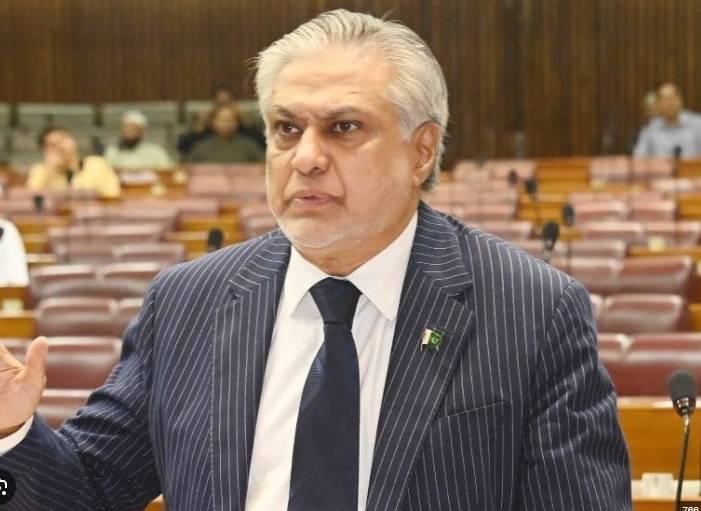Security of foreign diplomats govt’s top priority, says Ishaq Dar
Foreign minister briefs foreign diplomats: Says govt showed patience in handling Nov 24 protest: PTI has history of protests: No federating unit has the right to march on Islamabad

Stay tuned with 24 News HD Android App

Deputy Prime Minister and Foreign Minister Ishaq Dar has said that the security of Islamabad’s Red Zone had always been the priority for the government and a special law was enacted earlier this year to ensure the protection of the diplomats, reported 24NewsHD TV channel.
Ishaq Dar said this while briefing members of the diplomatic corps on the recent situation caused by the protesters of the Pakistan Tehreek-e-Insaf (PTI), reaffirming the government’s commitment to ensure the security of the Red Zone.
During the briefing to foreign diplomats at the Foreign Office in Islamabad on Wednesday, Ishaq Dar said that there were special laws regarding the security of the Red Zone.
While referring to the PTI, he said that the party had a history of protests. “In the past, the party had held a sit-in against alleged rigging in the general elections,” Dar said, and added, “The term ’35 punctures’ was coined by the same party to refer to the rigging.”
He went on to say that on November 24, when a foreign country’s delegation was in the country, the party surprisingly announced a protest at Islamabad’s D-Chowk.
Dar said the government demonstrated complete patience in handling the protest of a political party on 24th November.
The deputy prime minister informed the foreign diplomats that the law-enforcement agencies were not provided with live ammunition, but water cannon, tear gas and batons.
Dar also emphasized that the Army was called in as per the constitution and it remained in the third defence line to protect the diplomatic corps and federal institutions, including the Parliament House, the Prime Minister's House, and the Presidency.
The foreign minister regretted the use of resources of Khyber Pakhtunkhwa government in the protest by the political party, stressing that no federating unit has the right to march on the capital.
Ishaq Dar mentioned that ensuring the Red Zone remains free from protests and violence has been a priority of the government and for this purpose, a special law was enacted earlier this year to ensure the security of diplomats.
He also pointed out that it was surprising that this particular party chooses to protest when foreign delegates visit Pakistan.
During the detailed briefing, Ishaq Dar said the government had enacted a new law “Peaceful Assembly and Public Order Act, 2024” that barred the protest demonstrations in the Red Zone and required permission from a magistrate for any public gatherings.
Explaining why the government resorted to certain actions against the protestors, he said the Islamabad High Court had barred the PTI from holding any protest gathering in the Red Zone. In pursuance of the court ruling, the government had tasked Interior Minister Mohsin Naqvi to engage with the party but the efforts remained unsuccessful.
He said the federal government always prioritised the Red Zone’s security which housed Parliament House, Supreme Court of Pakistan, federal institutions and the diplomatic corps.
Dar informed the diplomats that PTI had chosen to hold a protest on November 24, which coincided with the planned visit of the Belarusian president. He noted that this was consistent with the party’s past malafide practice of scheduling protests on significant dates, such as the SCO summit earlier this year and in 2014, when their protest led to the postponement of the Chinese president’s visit.
He recalled that the Supreme Court had dismissed PTI’s claims of rigging in 35 National Assembly seats—the primary reason behind the 2014 sit-in—yet the party never apologized, despite having committed to do so in a written agreement with the government.
Dar explained that PTI stubbornly attempted to march into the Red Zone, despite the government’s offer of an alternative protest site in Sangjani. He emphasized that freedoms and human rights should not be exercised in ways that cause lawlessness and endanger the lives and property of both Pakistanis and the diplomatic corps.
The deputy prime minister highlighted that the government had shown restraint, as law enforcement agencies were only equipped with water cannons and tear gas, not live ammunition. The police and Rangers were deployed in the first two tiers, with the army as the third line of defense to protect the Diplomatic Enclave, Parliament House, the Prime Minister’s House, and other important buildings.
Dar also questioned the legality of KP provincial government using public resources to stage a march on the federal capital, asserting that no federating unit had the right to do so.
Reporter Anwar Abass
